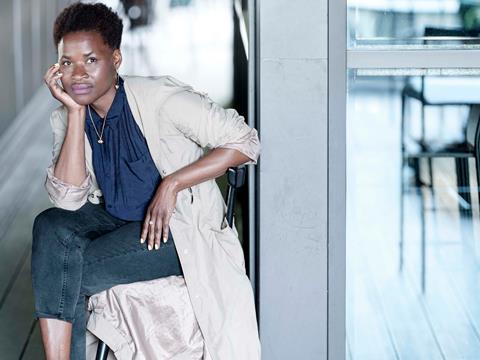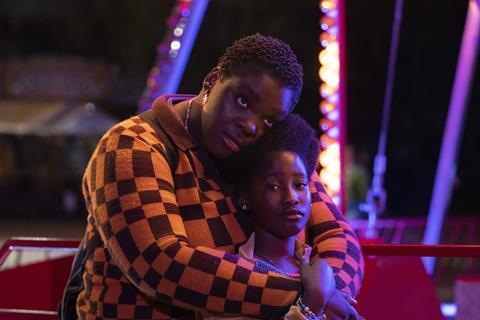
When Adura Onashile’s diretorial debut Girl opened this month’s Glasgow Film Festival (GFF) it was the first time a Scottish film has ever opened the Scottish festival.
“It seems like a Scottish story that maybe we haven’t seen in a while, or possibly ever,” says Onashile, of the film she shot in the city she now calls home.
Onashile was born in London and raised between the UK and Nigeria. She moved to Glasgow 12 years ago for a part in the play Roadkill by Cora Bissett, and never looked back. “It feels like you’re more connected to everybody else [in the Glasgow arts scene]. You have access to everybody in a way I definitely didn’t feel in London.”
Girl made its world premiere at Sundance and follows the intense but loving relationship between a young mother Grace (Deborah Lukumuena), an African migrant who has moved to Glasgow, and her child (Le’Shantey Bonsu). Grace is grappling with her own trauma while protecting her daughter from a world she does not trust.
“There’s a quietness to the film that feels particular to here [Glasgow],” Onashile says of the emotions she wanted to convey. ”Even though Glaswegians are very chatty and boisterous, there’s also something else going on sometimes. If you’re an outsider, you can feel quite isolated from the camaraderie and banter. If you’re a person of colour, or Black, you’re still relatively isolated.”
Film wasn’t always on the agenda for Onashile, who was named a Screen Star of Tomorrow in 2021. “I had no ambition for film. I’d always loved film – I grew up for part of my life in Nigeria, obsessive about Indian films. There was a kind of magic to it that I never thought I would have access to. Nobody I knew worked in film.”
Instead, she wrote and acted in plays.
“I did a play called Expensive Shit at the Edinburgh Fringe in 2016, and [Glasgow-based producers] Rosie [Crerar] and Ciara [Barry] got in touch after they’d seen it and said, ‘We’re a new company [barry crerar], we’ve just got a BFI Vision award and we want to look at alternative stories in Scotland.’ And I thought I’d give it a go. How could I not take this opportunity?”
From that collaboration Onashile wrote and directed her first short Expensive Shit, about a Nigerian toilet attendant working in a Scottish nightclub and started developing her first feature, also produced by barry crerar (part of Screen’s inaugural cohort of Rising Stars Scotland). “I had been obsessed with the mother-daughter thing for quite a while, and I wanted to draw a little bit from my experience as an only child and single parent family. I wanted to make it quite extreme.”
The feature was selected for the 2018-2019 round of UK development lab iFeatures, with Onashile initially on board only as a writer. After completing writing and directing Expensive Shit, that went on to premiere at BFI London Film Festival and was nominated for a Bafta, she stepped up to take the full reins of Girl.
Shooting took place in the pandemic-addled times of September 2021, “a really big ask for a first time director,” Onashile reflects. Production financing came from the BFI, BBC Film and Screen Scotland, in association with Great Point Media, with Polish outfit New Europe Film Sales boarding to represent sales. Studio Soho picked the film up for UK distribution at last month’s European Film Market.
“We couldn’t leave the house without being escorted”

Onashile drew on some difficult personal memories for her debut of growing up in 1980s Bermondsey, south London, an era in which the racist, far right and fascist National Front party was making its presence felt.
“When we lived in an estate in Bermondsey, we couldn’t leave the house without being escorted by someone from the council. I doubt that would happen now. It’s crazy that that’s what I’m judging as progress. It feels like change is not happening fast enough, though.
“I knew what I wanted to do [in Girl] was stay close with these characters, as much as possible. That was a challenge for my collaborators because you just don’t do that, you always get the wide shot. I became slightly obsessive with close ups. I felt it was a political act, not giving the context, not giving the reasons, not giving the machinations of immigration and Grace’s past. I just wanted you to look.
“It became quite personal – sometimes, growing up in London in the time I did, a lot of time was spent trying to hide and assimilate and play down difference. In this film I wanted to do the opposite. That felt liberating, but also scary.”
Up next, Onashile is finishing a script for the National Theatre of Scotland, and also has coming-of-age feature in the works, at script stage. “It’s about a trans man discovering himself on a journey across South America to find his father,” she says. “I’m queer, so I wanted to explore that in film, but not in the general coming out story but in a much more visceral, expressionist way, thinking about the body and landscape.”

























No comments yet